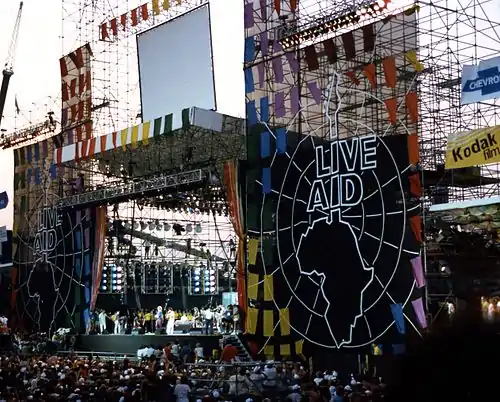Portal:1980s
The 1980s PortalThe 1980s (pronounced "nineteen-eighties", shortened to "the '80s" or "the Eighties") was a decade that began January 1, 1980, and ended December 31, 1989. The decade saw a dominance of conservatism and free market economics, and a socioeconomic change due to advances in technology and a worldwide move away from planned economies and towards laissez-faire capitalism compared to the 1970s. As economic deconstruction increased in the developed world, multiple multinational corporations associated with the manufacturing industry relocated into Thailand, Mexico, South Korea, Taiwan, and China. Japan and West Germany saw large economic growth during this decade. The AIDS epidemic became recognized in the 1980s and has since killed an estimated 39 million people (). Global warming became well known to the scientific and political community in the 1980s. The United Kingdom and the United States moved closer to supply-side economic policies, beginning a trend towards global instability of international trade that would pick up more steam in the following decade as the fall of the USSR made right-wing economic policy more powerful. The final decade of the Cold War opened with the US-Soviet confrontation continuing largely without any interruption. Superpower tensions escalated rapidly as President Reagan scrapped the policy of détente and adopted a new, much more aggressive stance on the Soviet Union. The world came perilously close to nuclear war for the first time since the Cuban Missile Crisis in 1962, but the second half of the decade saw a dramatic easing of superpower tensions and ultimately the total collapse of Soviet communism. Developing countries across the world faced economic and social difficulties as they suffered from multiple debt crises in the 1980s, requiring many of these countries to apply for financial assistance from the International Monetary Fund (IMF) and the World Bank. Ethiopia witnessed widespread famine in the mid-1980s during the corrupt rule of Mengistu Haile Mariam, resulting in the country having to depend on foreign aid to provide food to its population and worldwide efforts to address and raise money to help Ethiopians, such as the Live Aid concert in 1985. Major civil discontent and violence occurred, including the Angolan Civil War, the Ethiopian Civil War, the Moro conflict, the Ugandan Bush War, the insurgency in Laos, the Iran–Iraq War, the Soviet–Afghan War, the 1982 Lebanon War, the Second Sudanese Civil War, the Lord's Resistance Army insurgency, and the First Nagorno-Karabakh War. Islamism became a powerful political force in the 1980s and many jihadist organizations, including Al Qaeda, were set up. By 1986, nationalism was making a comeback in the Eastern Bloc, and the desire for democracy in socialist states, combined with economic recession, resulted in Mikhail Gorbachev's glasnost and perestroika, which reduced Communist Party power, legalized dissent and sanctioned limited forms of capitalism such as joint ventures with companies from capitalist countries. After tension for most of the decade, by 1988 relations between the communist and capitalist blocs had improved significantly and the Soviet Union was increasingly unwilling to defend its governments in satellite states. 1989 brought the overthrow and attempted overthrow of a number of governments led by communist parties, such as in Hungary, the Tiananmen Square protests of 1989 in China, the Czechoslovak "Velvet Revolution", Erich Honecker's East German regime, Poland's Soviet-backed government, and the violent overthrow of the Nicolae Ceaușescu regime in Romania. Destruction of the 155-km Berlin Wall, at the end of the decade, signaled a seismic geopolitical shift. The Cold War ended in the early 1990s with the successful Reunification of Germany and the USSR's demise after the August Coup of 1991. The 1980s was an era of tremendous population growth around the world, surpassing the 1970s and 1990s, and arguably being the largest in human history. During the 1980s, the world population grew from 4.4 to 5.3 billion people. There were approximately 1.33 billion births and 480 million deaths. Population growth was particularly rapid in a number of African, Middle Eastern, and South Asian countries during this decade, with rates of natural increase close to or exceeding 4% annually. The 1980s saw the advent of the ongoing practice of sex-selective abortion in China and India as ultrasound technology permitted parents to selectively abort baby girls. The 1980s saw great advances in genetic and digital technology. After years of animal experimentation since 1985, the first genetic modification of 10 adult human beings took place in May 1989, a gene tagging experiment which led to the first true gene therapy implementation in September 1990. The first "designer babies", a pair of female twins, were created in a laboratory in late 1989 and born in July 1990 after being sex-selected via the controversial assisted reproductive technology procedure preimplantation genetic diagnosis. Gestational surrogacy was first performed in 1985 with the first birth in 1986, making it possible for a woman to become a biological mother without experiencing pregnancy for the first time in history. The global internet took shape in academia by the second half of the 1980s, as well as many other computer networks of both academic and commercial use such as USENET, Fidonet, and the Bulletin Board System. By 1989 the Internet and the networks linked to it were a global system with extensive transoceanic satellite links and nodes in most developed countries. Based on earlier work, from 1980 onwards Tim Berners Lee formalized the concept of the World Wide Web by 1989. Television viewing became commonplace in the Third World, with the number of TV sets in China and India increasing by 15 and 10 times respectively. The Atari Video Computer System console became widespread in the first part of the decade, often simply called "Atari". 1980's Atari VCS port of Space Invaders was the first killer app. The video game crash of 1983 ended the system's popularity and decimated the industry until the Nintendo Entertainment System re-established the console market in North America. The hand-held Game Boy launched in 1989. Super Mario Bros. and Tetris were the decade's best selling games. Pac-Man was the highest grossing arcade game. Home computers became commonplace. The 1981 IBM PC led to a large market for IBM PC compatibles. The 1984 release of the Macintosh popularized the WIMP style of interaction. (Full article...) The decade was great socioeconomic change due to advances in technology and a worldwide move away from planned economies and towards laissez-faire capitalism. The 1980s was an era of tremendous population growth around the world, surpassing even the 1970s and 1990s, thus arguably being the largest in human history. Population growth was particularly rapid in a number of African, Middle Eastern, and South Asian countries during this decade, with rates of natural increase close to or exceeding 4% annually. The AIDS epidemic became recognized in the 1980s and has since killed an estimated 39 million people (as of 2013).[1] Global warming became well known to the scientific and political community in the 1980s. The 1980s saw great advances in genetic and digital technology. After years of animal experimentation since 1985 the first genetic modification of 10 adult human beings took place in May 1989, a gene tagging experiment[2] which led to the first true gene therapy implementation in September 1990. The first "designer babies", a pair of female twins were created in a laboratory in late 1989 and born in July 1990 after being sex-selected via the controversial assisted reproductive technology procedure preimplantation genetic diagnosis.[3] Gestational surrogacy was first performed in 1985 with the first birth in 1986, making it possible for a woman to become a biological mother without experiencing pregnancy for the first time in history.[4] The global Internet took shape in academia by the second half of the 1980s as well as many other computer networks of both academic and commercial use such as USENET, Fidonet and the Bulletin Board System. By 1989 the Internet and the networks linked to it were a global system with extensive transoceanic satellite links and nodes in most rich countries.[5] Based on earlier work from 1980 onwards Tim Berners Lee formalized the concept of the World Wide Web by 1989 and performed its earliest demonstrations in December 1990 and 1991. Television viewing became commonplace in the Third World, with the number of TV sets in China and India increasing by 15 and 10 times respectively.[6]
Selected article -
The moonwalk, or backslide, is a popping dance move in which the performer glides backwards but their body actions suggest forward motion. It became popular around the world when Michael Jackson, started during the performance of "Billie Jean" on Motown 25: Yesterday, Today, Forever, which was broadcast on 1983. He included the moonwalk in tours and live performances. Jackson has been credited as renaming the "backslide" to the moonwalk and it became his signature move. (Full article...)
Did you know (auto-generated) -
Selected picture President Reagan signs the bill making Martin Luther King, Jr.'s birthday a national holiday.. Credit: U.S.Government President Reagan signs the bill creating Martin Luther King Jr. Day as a national holiday.
TopicsSelected biography -Boris Franz Becker (German pronunciation: [ˈboːʁɪs ˈbɛkɐ] ⓘ; born 22 November 1967) is a German former world No. 1 tennis player. Becker is the youngest-ever winner of the gentlemen's singles Wimbledon Championships title, a feat he accomplished aged 17 in 1985. Becker is regarded as one of the greatest tennis players of all time and was featured in the list of Tennis magazine's 40 greatest players on its 40th anniversary in 2006. He won 64 titles overall, including an Olympic gold medal in doubles in 1992. Becker won 49 singles and 15 doubles titles including six Grand Slam singles titles: three Wimbledon Championships, two Australian Opens and one US Open, 13 Masters titles, three year-end championships and leading Germany to back-to-back championship wins in Davis Cup 1988 and 1989. Becker is often credited as a pioneer of power tennis with his lightning fast serve and explosive all-court game featuring flying through the air volleys, acrobatic dives, rolls and crushing service returns. He is also among the top ten players with the best win percentages in the history of the ATP Tour. (Full article...)General imagesThe following are images from various 1980s-related articles on Wikipedia.
|
 |
You are invited to participate in WikiProject History, a group of editors dedicated to developing and improving articles about History. If interested, add your name to our list of members |
 |
You are invited to participate in WikiProject Years, a WikiProject dedicated to developing and improving articles about years, decades, centuries, and millennia. |
List articles
Associated Wikimedia
The following Wikimedia Foundation sister projects provide more on this subject:
-
 Commons
Commons
Free media repository -
 Wikibooks
Wikibooks
Free textbooks and manuals -
 Wikidata
Wikidata
Free knowledge base -
 Wikinews
Wikinews
Free-content news -
 Wikiquote
Wikiquote
Collection of quotations -
 Wikisource
Wikisource
Free-content library -
 Wikiversity
Wikiversity
Free learning tools -
 Wiktionary
Wiktionary
Dictionary and thesaurus
Sources
- "Global HIV/AIDS Overview". aids.gov. Retrieved 16 April 2016.
- "Recent advances in pediatrics-17". Jaypee Brothers Publishers. ISBN 978-81-8448-103-7. Retrieved 16 April 2016.
- "Genetic Defect Screened Out; Healthy Twins Born". latimes. Retrieved 16 April 2016.
- "And Baby Makes Four: for the First Time a Surrogate Bears a Child Genetically Not Her Own". people.com. Retrieved 16 April 2016.
- Ian Brown (2013). Research Handbook on Governance of the Internet. Edward Elgar Publishing. p. 7. ISBN 978-1-84980-504-9.
- Singhal, Arvind; Doshi, J.K.; Rogers, Everett M.; Rahman, S. Adnan. "The Diffusion of Television in India" (PDF). Media Asia. 15 (4): 222–229. Retrieved 2015-04-18.
-
 List of all portalsList of all portals
List of all portalsList of all portals -
 The arts portal
The arts portal -
 Biography portal
Biography portal -
 Current events portal
Current events portal -
 Geography portal
Geography portal -
 History portal
History portal -
 Mathematics portal
Mathematics portal -
 Science portal
Science portal -
 Society portal
Society portal -
 Technology portal
Technology portal -
 Random portalRandom portal
Random portalRandom portal -
 WikiProject PortalsWikiProject Portals
WikiProject PortalsWikiProject Portals













.JPG.webp)












